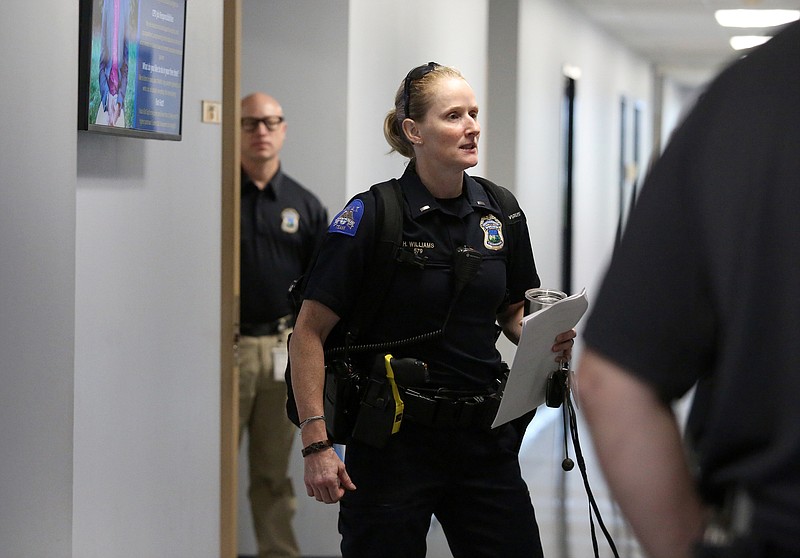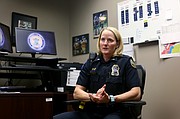For Chattanooga Police Lt. Heather Williams, the department's second - and right now only - female SWAT officer, National Women in Law Enforcement Day, which is Thursday, means recognizing the women who paved the way.
"It's awesome that we have a day like that [to honor] the females that have dedicated themselves to laying the groundwork for the rest of us," she said, in a nod to two of the first female officers hired by the Chattanooga Police Department.
The two women - Melinda Bryan and Helen Cooper - were recognized last month during the police department's annual award ceremony.
Nearly 50 years ago, Bryan is credited with making it so that female officers didn't have to wear skirts, police Chief David Roddy said during the Aug. 29 ceremony. And Cooper was one of the first women to graduate from the FBI's National Academy in Quantico, Virginia.
"These are the women that braved and trail blazed that path for those cadets and we could not be prouder," he said before presenting them the award.
Thanks to their efforts, Williams is now one of 48 women currently on the police force.
Williams, who has been in law enforcement for 18 years, got her start right out of graduate school. While her master's degree is in criminal justice, she's always had an interest in forensic work and studied biology and chemistry as an undergrad.
So after about six years on patrol, she applied to be a crime scene investigator.
"Working in patrol, you kind of get an idea of what a crime scene is going to be like because you work crime scenes as a patrol officer, but not as in depth as a crime scene investigator," she said. "You get your hands dirty a lot."
Over the years, 41-year-old Williams has processed hundreds of scenes, including the July 16, 2015, terrorist attack.
On that July day, 24-year-old Mohammad Youssef Abdulazeez opened fire at a joint military recruitment center, injuring a Marine recruiter. Abdulazeez then sped to the U.S. Naval and Marine Reserve Center on Amnicola Highway, where he opened fire again.
Gunnery Sgt. Thomas Sullivan, 40; Navy Petty Officer 2nd Class Randall Smith, 26; Staff Sgt. David Wyatt, 35; Sgt. Carson Holmquist, 25; and Lance Cpl. Squire "Skip" Wells, 21, all died in the attacks.
That scene took nearly two weeks to scan, Williams said.
The next year, on Nov. 21, a school bus carrying 37 children of elementary age, veered off Talley Road in Brainerd and collided with a utility pole, overturning and crashing into a tree.

Six children from Woodmore Elementary School died - Zyaira Mateen, 6; D'Myunn Brown, 6; Zyanna Harris, 10; Cor'Dayja Jones, 9; Zoie Nash, 9, and Keonte Wilson, 8 - and dozens more were injured in the crash.
Williams was one of the first to arrive on scene just after the call came in at around 3:30 p.m. and, like many others, she stayed there until 9 a.m. the next day, helping get the surviving and deceased children out and processing evidence.
"It probably took another week or so to actually finish processing that scene," she said.
Williams became interested in joining the department's SWAT team right out of the academy after going on a few calls with her field training officer.
"I was like, I love this. I would love to do this!" she said.
She tried out a few times and finally made the team about 13 years ago.
"Being a female at that time, it was difficult. But I got on and loved it," she said. "It was stressful, but it was a lot of team building. It was a lot of discipline, paying attention to details. So, and as long as you did those things, you keep up your physical fitness, it was good."
Now, as a lieutenant, her days are typically filled with a lot of administrative duties - paperwork, running to and from meetings, advising subordinates - and community and interdepartment outreach.
Williams also mentors a University of Tennessee at Chattanooga student, Morgan Hill, who is studying criminal justice and hopes to one day work for the FBI.
One of the main programs she's helped spearhead is the department's recently implemented peer support group for officers who have experienced trauma.
"It gets difficult because if we don't help ourselves and take care of ourselves, what good are we gonna be to anybody else," she said. "Self care is huge."
She, Lt. Daniel Jones and a handful of other officers drafted the policy for the program.
"That's where our big sticking point was, was how do we make this to where it is confidential, and to be able to explain and make the officers believe that it's confidential," she said. "You know, they have to be reassured that this stuff isn't gonna get out, and executive staff can't use it against them" during disciplinary investigations or hearings.
That kind of peer support is helpful, especially with female officers, she said.
"It was a little difficult being accepted when I first got on," she said. "You had a lot more - you felt that you had to prove more that you're just as good as that male officer. And sometimes, it felt like even when you're better than that officer, they took it as in, 'Well, you think you're better than everybody. You think you're stronger than everybody. You think you know more than everybody.' But that wasn't the case. It was I'm trying to be just as good as you so that you have confidence in me that I can do my job."
While things aren't as difficult for new female officers today, Williams does find herself giving advice to newer female officers about anything from tactical training to how to deal with interdepartmental drama.
"The stuff that I went through then has made me smarter," she said. "It actually allows me to help other females now that go through some things. I've had some come to me because they were dealing with something, and it was nice to be able to give them advice on how to deal with the situation because I've been there myself."
Back when she first started, it was hard, she said, because there wasn't anyone to turn to for advice, "so you balled it up."
"So now it's great," she said "Because there are people to go to and talk to," whether it's about how to deal with working relationships or debriefing after a traumatic event.
Contact Rosana Hughes at rhughes@timesfreepress.com or 423-757-6327 with tips or story ideas. Follow her on Twitter@HughesRosana.


